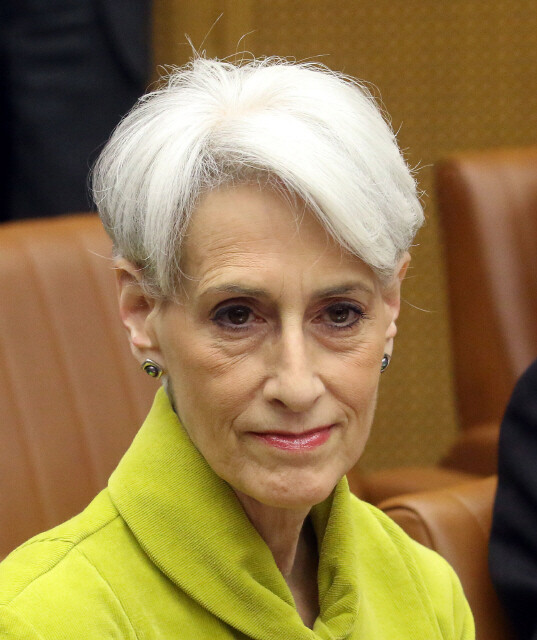hankyoreh
Links to other country sites 다른 나라 사이트 링크
Wendy Sherman: must prepare for possible North Korean “coup or collapse”

Wendy Sherman, former US Under Secretary of State for Political Affairs, served as coordinator for North Korean policy during the administration of former US President Bill Clinton. Her record as one of the "doves" who were closely involved when the US and North Korea nearly normalized diplomatic relations in 2000 also created complications for her confirmation as Under Secretary of State because of opposition from the Republican Party.
But during a speech during a luncheon in a seminar about the Korean Peninsula that was jointly organized by the US Center for Strategic and International Studies (CSIS) and South Korean newspaper the Joongang Ilbo on May 3, Sherman made clear that she is more aligned with the hawks, arguing that key countries need to be thinking about "unexpected scenarios like a sudden regime collapse or coup.”
Given that Sherman is playing a key role in crafting security and foreign policy in Hillary Clinton’s bid to become the Democratic candidate for president, and considering that Sherman is also being mentioned as a possible Secretary of State if Clinton is elected, concerns are being raised about Sherman's comments.
Furthermore, through January of last year, Sherman set the US government's policy priorities and adjusted its mid- and long-term policy direction while serving as the Under Secretary of State for Political Affairs, the fourth-highest position in the State Department, in the Obama administration. As such, her comments are thought to shed light on the inner workings of the Obama administration’s policy toward North Korea.
While Sherman said during her speech that sanctions against North Korea are not the only solution for the North Korean nuclear issue, she spent a considerable part of her speech arguing that "the level of sanctions required to force North Korea to seek to negotiate a denuclearization agreement would need to be so severe that the regime would believe they could trigger a near-term collapse or a coup."
Noting that China's priority is the stability of the Korean Peninsula, she said that "the status quo likely is not sustainable" and argued that South Korea, the US, China and Japan need to be preparing for military clashes that could arise if South Korea and the US respond to a North Korean collapse, coup or attack.
Sherman also specified the topics relating to a North Korean collapse that should be discussed in detail: namely, the short-term measures to be taken by the South Korea, US and Chinese militaries; ways to avoid clashes between each of these militaries; measures to handle the refugee issue; and ways to cover the economic cost.
But Sherman's remarks ignore the fact that, if North Korea is pushed too far, the resulting military conflict could initially cause more damage to South Korea than to the US.
"There seems to be a shift toward resolving the North Korean nuclear issue not through negotiations but rather through a 'sudden crisis' inside North Korea. I'm unsure whether South Korea would really be able to handle the consequences of that," said Seo Hun, former third deputy director of the National Intelligence Service, who participated in the seminar.
"Perhaps this was supposed to be a warning to North Korea, but if this reflects attitudes inside the US government, you can't help but be concerned," Seo said.
By Yi Yong-in, Washington correspondent
Please direct questions or comments to [english@hani.co.kr]
Editorial・opinion
![[Guest essay] The real reason Korea’s new right wants to dub Rhee a founding father [Guest essay] The real reason Korea’s new right wants to dub Rhee a founding father](https://flexible.img.hani.co.kr/flexible/normal/500/300/imgdb/original/2024/0423/8317138574257878.jpg) [Guest essay] The real reason Korea’s new right wants to dub Rhee a founding father
[Guest essay] The real reason Korea’s new right wants to dub Rhee a founding father![[Column] ‘Choson’: Is it time we start referring to N. Korea in its own terms? [Column] ‘Choson’: Is it time we start referring to N. Korea in its own terms?](https://flexible.img.hani.co.kr/flexible/normal/500/300/imgdb/original/2024/0423/3617138579390322.jpg) [Column] ‘Choson’: Is it time we start referring to N. Korea in its own terms?
[Column] ‘Choson’: Is it time we start referring to N. Korea in its own terms?- [Editorial] Japan’s rewriting of history with Korea has gone too far
- [Column] The president’s questionable capacity for dialogue
- [Column] Are chaebol firms just pizza pies for families to divvy up as they please?
- [Column] Has Korea, too, crossed the Rubicon on China?
- [Correspondent’s column] In Japan’s alliance with US, echoes of its past alliances with UK
- [Editorial] Does Yoon think the Korean public is wrong?
- [Editorial] As it bolsters its alliance with US, Japan must be accountable for past
- [Guest essay] Amending the Constitution is Yoon’s key to leaving office in public’s good graces
Most viewed articles
- 1[Column] ‘Choson’: Is it time we start referring to N. Korea in its own terms?
- 2Why Korea shouldn’t welcome Japan’s newly beefed up defense cooperation with US
- 3Senior doctors cut hours, prepare to resign as government refuses to scrap medical reform plan
- 4[Guest essay] The real reason Korea’s new right wants to dub Rhee a founding father
- 5Samsung barricades office as unionized workers strike for better conditions
- 6Opposition calls Yoon’s chief of staff appointment a ‘slap in the face’
- 7[Column] The clock is ticking for Korea’s first lady
- 8[Editorial] Japan’s rewriting of history with Korea has gone too far
- 9New AI-based translation tools make their way into everyday life in Korea
- 10Terry Anderson, AP reporter who informed world of massacre in Gwangju, dies at 76